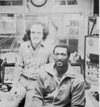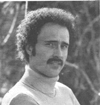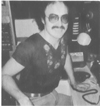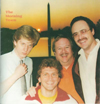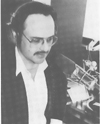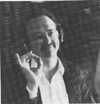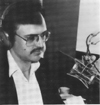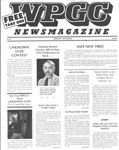I
keep finding myself thinking about the best days of my career,
or at least the most fun days of it.. There were hard days to
be sure, and certainly there have been other highlights since
'PGC, but being in Bladensburg
and Greenbelt
are some of my absolute best memories.
From
Jim Elliott pulling up next
to me in his orange 240Z in the parking lot at Howard Johnson’s
and introducing himself – to standing in the control room
watching Liz Kiley pull off
another perfect break and getting that wicked grin...it was
a wild ride.
Through all the good times...and bad...I look back now with
great fondness on my ‘salad days’ at WPGC.
On
'The Great Strike That Struck Out':
I
guess I was pretty naive when I got to WPGC. I had no concept
of how nasty the Strike
was until a few years later when I first met the local AFTRA
representative and she wanted me put in jail...literally. After
I did my first shift, the late Jim
Collins met me across the street to offer me a full time
job after the strike was over. After I picked my jaw up off
the ground, I said yes of course. Neither of us knew what the
outcome of the strike would be, but he said that there were
a couple of people he'd be happy to replace anyway, once the
dust settled. Of course now we know that I would be replacing
Jim Elliott who moved to
morning drive.
On
Doing Middays Over & Over & Over...:
I did do a lot of different time-slots on PGC, but it always
came back to mid-days. Bill
Prettyman even told me once that I would be doing that shift
for the rest of my career because I was perfect for the job.
Steve Kingston ended
up saying exactly the same thing a few years later and even
hired me to work at Z-100 for that very purpose, even though
things didn't work out that way.
On
Replacing Elliott & Woodside:
I
always felt like the utility infielder for the franchise who
could step in at any moment and play any position without being
a liability to the team. When Elliott
& Woodside crossed
the street to Q107, Kingston
immediately brought Joe Theismann
in to do mornings and asked me to ride herd on the all-star
Redskins QB and provide some radio sense for the guy. It turned
out I didn't need to do much except act as traffic cop, which
was fine with me. Joe and I hit it off pretty famously and I
ended up getting to know him and his family as well as anyone.
The
really good news for 'PGC was, Elliott
& Woodside never
beat us in mornings during those two years until management
reluctantly dissolved the show. (They came close but never surpassed
us 12+ or 18-35.) Joe's other interests got to be too time consuming.
That's when we started experimenting with comedians. Dude
Walker and I were two straight guys in search of a real
comedian, but looking back, I have to say it just never seemed
to click. Bill Prettyman
was (as usual) right. I didn't belong in morning drive and
they felt, rightly so, that J.
Robert Howe and I couldn't carry it all by ourselves. (J.
Robert Howe had left a few months before.)
On
Elliott & Woodside Not Having A Contract:
I
know that Jim was a great negotiator, and no doubt knew precisely
why ABC was trying so desperately to get E&W out and probably
also knew that eventually they would throw enough money at them
to make it happen. Having gone through the Great Strike
That Struck Out, he was leery of any contract First Media
would put up.
Also,
he didn’t trust any contract that First Media would offer.
He once told me that contracts really don’t protect the
employee anyway. All they do for the employee is outline the
terms of employment. The real protection is for the company.
He also knew that he and Scott were the franchise players.
On
The Reaction At WPGC When E&W Left:
I don't know precisely what went on between Steve Kingston and
Charlie Giddens, but there was a steely resolve that I'm not
sure I saw in Steve before or since. Charlie, being the eternal
optimist, decided immediately to recruit Joe Theismann. The
two of them went to work immediately.
On
The Search For A New Morning Show:
Kingston
knows everybody who is anybody in the business and he started
a talent search immediately, quietly at first and more public
as time went on. I know he made a few offers to established
morning shows in several major markets, but they either wanted
too much, had iron-clad contracts or weren’t interested
in DC as a career move. I was ALWAYS the temporary solution.
Kingston has always maintained that I was the perfect midday
jock. Doing mornings permanently was never in the cards for
me as long as Steve was handling programming.
On
The Hiring Of Joe Theismann:
Theismann
was not part of anyone’s plan until the day E&W walked.
I don’t know who broached the idea, but after Steve and
Charlie sat for a couple of hours, Steve reached out. He knew
Joe’s agent, Bill Morris (no relation to William Morris)
through a mutual friend and Bill immediately called Joe. Bill
and Joe loved the idea of daily (almost) exposure on WPGC and
they came to terms pretty quickly.
On
Hiring Dude Walker:
Steve
always liked Dude, as did I, even without Doug Limerick, but
his contract at Q107 prohibited him from coming to WPGC until
he did. By then, it was obvious that the Foxx / Theismann ploy
was working, so Charlie invited Joe back on a more limited scale
to do his deejay thing and offer insight into what the Redskins
were doing each week. Kingston simply waited out Dude’s
contract. It was clear to me that Dude was coming to do mornings
from the outset.
On
J. Robert Howe:
As
far as J. Robert Howe goes, don’t forget that I knew him
long before he came to DC. We’d been competitors in Utah
and I had the utmost respect for his style and presentation.
He certainly had an interesting delivery and he was as professional
as they come. J’s problem was that he loved Utah Valley,
as did his family. They didn’t much care for life in Washington
and he let management know that he really wanted to go home.
It struck a chord with First Media President, Glenn Potter so
they obliged him. He certainly was not the prototypical morning
news guy, but I remain convinced that given time and had his
heart been in it, he could have ended up being one of DC’s
more enduring broadcast figures.
On
Jerry Steele:
Jerry was a cipher to me. I never understood why he was there.
Frankly, I don’t think he knew either. He’s a really
nice guy, probably too nice to be a PD, but programming was
never in his DNA. He understood that the ONLY reason he was
there was to toe the line on the music. Once
GM, Charlie Giddens was gone and PD, Steve Kingston was up in
Pittsburgh meeting his future bride at B-94, Jerry Steele was
sitting in the PD chair wondering how the hell he got there.
Glenn
Potter was convinced that Soft Rock was the smart move. He pointed
to WASH doing the softer image thing that got pretty crappy
ratings but made them gobs and gobs of money. What he refused
to understand was that WASH was really good at Soft Rock. (FIRST
rule of marketing: First in wins…every time.)
That
is precisely what got Kingston out and Jerry in. Kingston fought
the change tooth and nail, giving us ‘spike’ records
to play to help keep the old heritage. The problem was, by then
Dan Mason was VP at First Media and he snuck into town one day
and tracked what we were actually playing. Jerry was simply
a yes man, dragged in from Houston because they knew he would
do what they told him. Jerry was a nice enough guy who should
never have been a Program Director. He had no vision, although
he was an excellent Music Director.
On
Jeanne Oates:
Jeanne
Oates never understood that radio is part science and part art.
She was pure science and never had the passion a truly great
GM needs to be successful. The last I heard, she had taken another
station in Florida down the tubes, this one a “Beautiful
Music” format station. How is that even possible?
I
did tell Jeanne many, many times that she was doing it wrong,
but I was just a fly buzzing around her head. She wanted to
take a souped-up 1957 Chevy with Doug Thorley headers and a
Hurst 5-speed tranny and turn it into a family station wagon.
All I can assume at this late date is that she had no concept
of branding and imaging. She and Glenn Potter had a winning
straight flush in their collective hands and threw it in, hoping
for a Royal.
When
Al Casey left and Alan Hotlen took over as PD, I finally saw
the handwriting on the wall. By then, Kingston was in Baltimore
so I picked up the phone. He said yes and after six months at
B-104, I was on my way to New York City.
On
Glenn Potter:
Glenn
Potter too had little passion for the art side of radio. He
was a numbers guy, all the way, but he was actually a smart
and decent human being. I saw him do a number of things privately
that made him an exceptional man in my view. I might hesitate
if he asked me to work for him again, but I might, based on
his humanity.
On
John Dowling:
I
didn’t personally mind the change in the music so much,
especially when John Dowling was doing the Oldies thing in the
evening. Professionally though, I knew it was suicidal. I also
knew the person signing the checks wanted it that way. I’m
not proud of it, but staying DID eventually lead to the gig
of a lifetime. Had I quit in disgust at that point, I likely
would have spent the rest of my career bemoaning the demise
of WPGC as I drifted from market to market.
Baker
& Byrd:
When
GM, Charlie Gidden's replacement, Jeanne Oates saw that Jerry
Steele had the station in a straight nose dive she started immediately
trying to rectify the situation. Enter Al Casey. Al was up front
about everything a “totally in the daylight” kind
of guy. He
was very clear from the outset that his mandate from First Media
was to start over with the morning show. He confided in me several
times that he thought where we were musically way off center,
but he really busted his butt to put Baker and Byrd together.
My confidence started to grow again and the job became more
than a paycheck for the first time since Steve Kingston left.
On
Talking With Q107 PD, Alan Burns:
Alan
Burns and I spoke exactly once. He made an inquiry and I called
back. But, he was fairly happy with his lineup and I hadn’t
quite figured out how bad things were at WPGC. We hung up, both
glad we had spoken, but I didn’t feel we needed to pursue
things further. I thought he felt the same way, but a couple
of weeks later, Scott Woodside invited me to Elliott & Woodside’s
night club in Crystal City for a drink. We caught up a little
and then he asked me, “Are you sure?” After a very
long pause while I was trying to figure out what he meant, I
said yes.
On
'Trashy 95':
By
the time Jeanne Oates came
to town and started tinkering with the format, changing the
name of the station to Classy 95 (puke!) I knew it was
a dead horse too, but every time I started to look around for
a better gig, management kept coming up with more money, making
it harder and harder to exit. Even once she was unceremoniously
dumped from the station, the big-wigs kept coming back with
more and more money. Finally, Steve
Kingston said the magic words, "No amount of money
can substitute for your pride". I knew he was right.
On
Al Casey:
I
remember Al Casey watching
a conversation I had with someone else at WPGC one time, about
LSD and how people suffer flashbacks later in life. Al interrupted
and said that was a myth. Both of us looked at him with surprise.
He said, “I did my time in Haight-Ashbury back in the 60s,
which included dropping a lot of acid.” (He was totally
clean by the time he got to WPGC.) He continued, “I’ve
prayed for flashbacks!” He thought the experience was pretty
cool, but would never do it again. I guess those days took their
toll.
Al
was the kindest and most gentle man I think I’ve ever known.
And frankly, he probably forgot more about programming than
most Program Directors ever know in their lifetimes. He was
brilliant.
On
Leaving WPGC:
As
it turned out, Steve
Kingston offered me even money to come do mid-days
for him in Baltimore for the now defunct B-104. I was never
so glad to get out of a place as I was that day. Of course,
it wasn't long after that that the Cook Inlet Company, a group
financed by the Eskimos who raked in so much money from the
Alaska Pipeline that they were looking for any kind of investment
property, bought WPGC. Dan Mason
swooped in and changed the format to Urban and that was the
definitive end of the legendary station, even though it had
been dying for several years by then.
On
The Glory Years:
I
look back on the glory days of WPGC, post 'The
Strike That Struck Out' with a fondness I cannot describe.
A lot of the people who passed through those halls went on to
much bigger careers, but I doubt sincerely that any of those
careers included jobs that were better. The founding father
of Z-100 (Scott Shannon)
and his successor (Steve
Kingston) were there. Half of one of Los Angeles'
biggest morning shows (Gene
Baxter) was there. One of the nation's best Program Directors
(Liz Kiley) was there. One
of America's leading talk-show hosts (Glenn
Beck) was there too. And I knew them all when we were a
band of radio renegades in our nation's capitol. What a trip!
On
Washington Radio Today:
I
visit Washington pretty frequently and scan the dial, looking
for a station that no longer exists. I am constantly disappointed.
Oh, there are some decent sounding stations there, but none
of them have the same energy and spark that WPGC had. CHR as
a format, barely exists in Washington. Washington radio is a
very twisted thing, with so many of the music station's trying
desperately to cater to the inner city folks with little or
no thought to all the people living in the sprawling suburbs.
Most of the Washington radio people I know are very parochial
in their views on the business and don't realize how bad things
are. I keep waiting for someone to come into DC and program
a real CHR station with a super strong lineup and kick that
town's butt. So far...not even close.
Thank you for putting this site up. It's nice to know that someone
knows what a powerhouse CHR can do in a town like Washington.
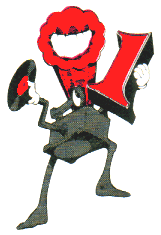
![]()
![]()
![]()
![]()
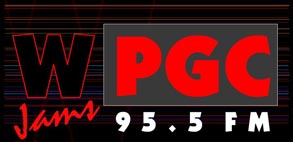

![]()

